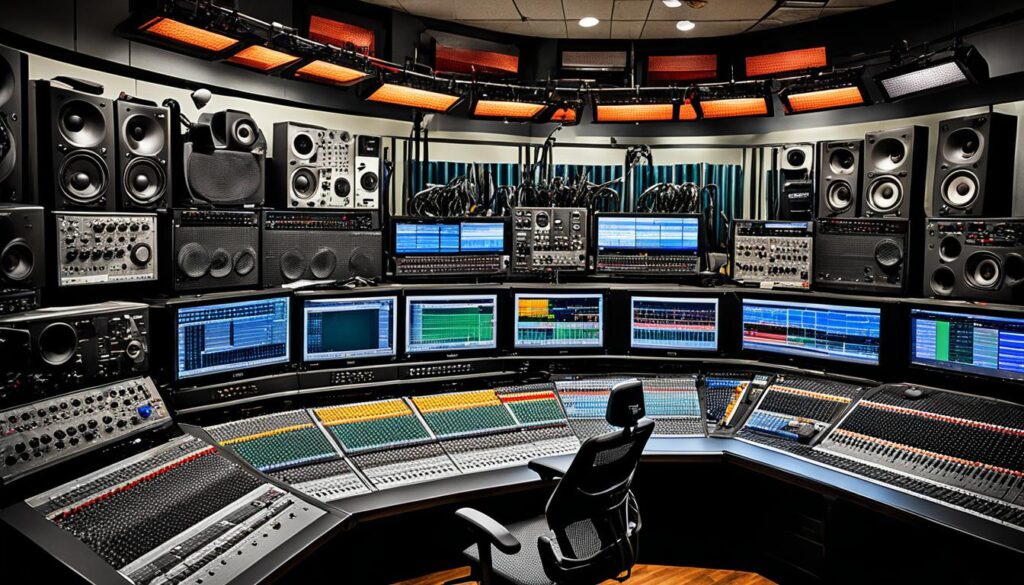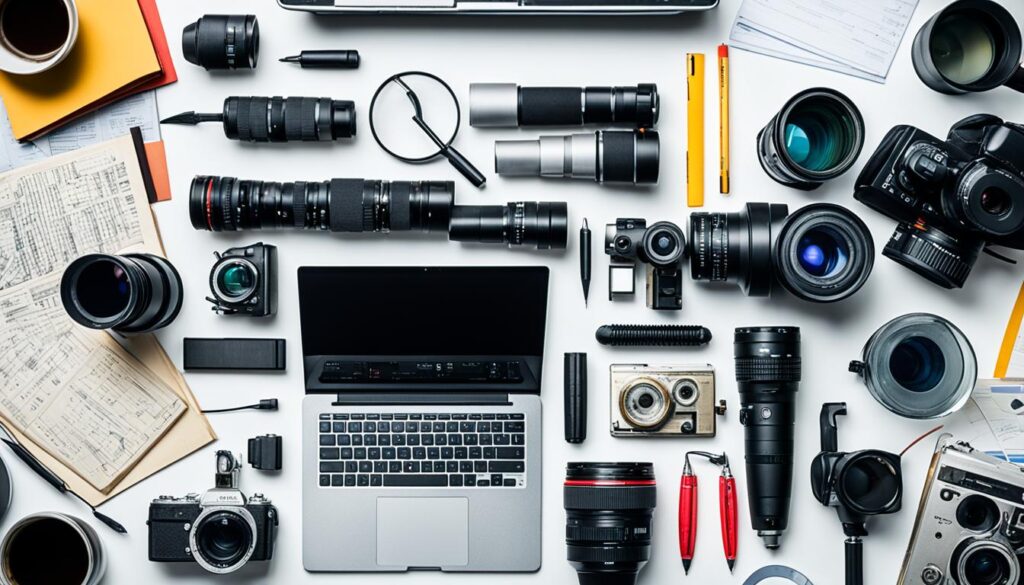Setting up a station requires careful planning and consideration. We understand the importance of creating a professional station setup to ensure a seamless broadcasting experience. In this article, we will provide you with expert tips and best practices for setting up your station like a pro.
Choosing Your Concept and Branding Your Station
When it comes to setting up your station, determining the right concept and branding is essential. This involves making key decisions about your station’s content, format, and target audience. Let’s explore the crucial elements you need to consider:
Determining Your Concept
Your station’s concept forms the foundation of your programming. It shapes the type of content you’ll broadcast and the overall experience for your listeners. Consider the following questions:
- Will your station focus solely on music, or will you include other types of content like talk shows or news segments?
- What genre(s) of music will you feature? Will it be a specific genre or a mix of various genres?
- Do you plan to have radio presenters or DJs to engage with your audience?
- Are there any specific topics or themes you want your radio shows to explore?
By answering these questions, you’ll have a clearer vision of your station’s concept and the direction you want to take.
Branding Your Station
Once you’ve decided on your station’s concept, it’s crucial to develop a strong brand that resonates with your target audience. This involves selecting an appropriate station name and ensuring it’s unique and memorable. Here are some steps to consider:
- Select a station name that reflects your concept and appeals to your audience. Avoid names that are too generic or similar to existing stations.
- Perform a trademark search to verify that your chosen name isn’t already trademarked. This will help you avoid legal issues down the line.
- Consider using brand name generators to get unique station name ideas. These tools can provide creative inspiration and help you find a name that stands out.
Remember, your station’s name and branding will play a key role in attracting listeners, so take the time to craft a compelling brand identity.
| Concept Decision | Benefits |
|---|---|
| Focus on a specific music genre | – Builds a dedicated audience – Establishes expertise in the chosen genre |
| Incorporate talk shows and interviews | – Offers diverse content for listeners – Provides opportunities for engaging conversations |
| Showcase local independent artists | – Supports upcoming musicians – Differentiates from mainstream stations |
“Your station’s concept should align with your passion and expertise. It’s an opportunity to create a unique listening experience that resonates with your target audience.”
Now that you have a clearer understanding of how to choose your concept and brand your station, you’re one step closer to setting up a professional and captivating broadcast. In the next section, we will explore the importance of understanding copyright laws when it comes to broadcasting music.
Understanding Copyright Laws
When setting up a station that involves broadcasting music, it’s crucial to understand and comply with music copyright laws. We must ensure that we have the necessary licenses and permissions to legally play copyrighted music. Failure to do so can result in legal consequences and damage to our reputation.
Depending on the country you are operating in and the countries you wish to broadcast to, purchasing a music license may be necessary. These licenses allow you to use copyrighted music in your broadcasts while compensating the artists and rights holders for their work. The cost of these licenses varies depending on factors such as the size and type of your station. It’s important to research and understand the specific copyright laws in your jurisdiction to ensure compliance.
To simplify the process and reduce licensing costs, another option is to use royalty-free music. Royalty-free music is music that you can use without having to pay royalties or additional fees each time it is broadcasted. There are various platforms and sources where you can find royalty-free music, such as YouTube Audio Library, Audio Blocks, and Jamendo. These platforms provide a wide selection of high-quality tracks that you can use legally in your broadcasts without worrying about copyright issues.
It’s important to note that even when using royalty-free music, you should still read and understand the terms and conditions set by the copyright owners. Some tracks may have certain usage restrictions or require proper attribution. Always ensure that you follow the guidelines provided to avoid any copyright infringement.
“Understanding and complying with music copyright laws is essential when setting up a station. Purchasing a music license or using royalty-free music can help you avoid legal complications and build a strong foundation for your broadcasting endeavors.”
The Benefits of Using Royalty-Free Music:
- Access to a wide variety of music genres and styles
- Cost-effective alternative to purchasing individual licenses for copyrighted music
- No need to worry about tracking usage and paying royalties
- Flexibility to use the music across different platforms and broadcasts
- Ease of mind knowing that you are complying with copyright laws
By understanding music copyright laws and utilizing resources like music licenses and royalty-free music, you can confidently build your station’s music library and entertain your audience legally. Remember to conduct thorough research, seek legal advice if needed, and always stay up to date with the latest developments in copyright legislation to ensure that you are operating within the boundaries of the law.
Gathering Equipment for Your Station
Setting up a professional radio station requires the right equipment to ensure high-quality sound and a seamless broadcasting experience. Fortunately, you don’t have to break the bank or navigate complex technical setups. In this section, we’ll explore the necessary equipment for a station, recommended microphones and headphones, and even delve into advanced radio studio setups.
Necessary Equipment for a Station
To get started, you’ll need a few essential pieces of equipment:
- A microphone: This is the heart of your radio studio. It’s recommended to invest in a high-quality USB condenser microphone, such as the Rode Podcaster, which offers a plug-and-play solution for a simple setup.
- Headphones: A good pair of closed-back headphones is crucial for monitoring audio and ensuring a clear sound. Look for headphones that provide accurate sound reproduction and comfort for long recording sessions.
- A registered Airtime Pro station: Airtime Pro is a reliable internet radio broadcasting software that simplifies the process of setting up and managing your station. With Airtime Pro, you can easily configure your station settings, schedule shows, and manage your content library.
Recommended Microphones and Headphones
For those who want to take their radio setup to the next level, here are some recommended microphones and headphones:
- Advanced Microphones: For capturing clear and professional-grade audio, consider investing in large-diaphragm condenser microphones like the Rode Broadcaster. These microphones excel at capturing voices and will elevate the quality of your broadcasts.
- Premium Headphones: If you’re looking for headphones with exceptional sound quality and durability, brands like Audio-Technica, Beyerdynamic, and Sennheiser offer a wide range of options to suit different budgets and preferences.
Advanced Radio Studio Setup
If you’re aiming for a more advanced radio studio setup, additional equipment can enhance functionality and expand possibilities:
- Audio Interface: An audio interface, like the Focusrite Scarlett range, acts as an intermediary between your computer and microphone, ensuring top-notch audio quality and flexibility in your recordings.
- Mixing Desk: A mixing desk allows you to control multiple audio sources, fine-tune sound levels, and add audio effects. Brands like Yamaha and Behringer offer a variety of mixing desks suitable for different studio setups.
- Additional Accessories: Depending on your specific needs, you may also consider investing in items such as pop filters, boom arms, shock mounts, and acoustic treatment to further enhance the audio quality of your broadcasts.
Remember, the equipment you choose should align with your specific needs and budget. Whether you opt for a basic setup or an advanced radio studio, selecting reliable brands and equipment will contribute to an exceptional broadcasting experience.

Finding News for Your Radio Show
If your radio station includes news-oriented programming, planning news items in advance is crucial. To efficiently gather news from various sources, we recommend utilizing the following tools:
- Feedly: This news aggregator allows you to subscribe to relevant RSS feeds and consolidate news content in one place. Stay informed by following industry-specific blogs, news websites, and authoritative sources.
- Tweetdeck: Manage your Twitter feed effectively with Tweetdeck. Create columns for specific hashtags, accounts, or keywords relevant to your news coverage. This tool helps you monitor real-time news updates and engage with your audience on social media.
- Google Alerts: Set up alerts for specific search terms related to your show’s theme. Google will send you notifications whenever new content is published online, ensuring you never miss breaking news or trending topics.
By using these tools, you can streamline the process of gathering news and stay on top of current events that resonate with your audience. It’s important to create a strategy for planning news items that align with your show’s theme and target audience.

Using Airtime Pro to Start Broadcasting
Are you ready to take your radio station to the next level? Look no further than Airtime Pro, the ultimate internet radio broadcasting software. With its user-friendly interface and powerful features, Airtime Pro simplifies the process of setting up and managing your station, allowing you to focus on creating quality content.
Getting started with Airtime Pro is a breeze. Simply sign up for a 7-day free trial and explore the wide range of features and benefits it offers. Whether you’re a seasoned professional or just starting out, Airtime Pro has everything you need to succeed.
With Airtime Pro, you have full control over your station. Easily configure your station settings, customize your playlists, and schedule shows with ease. You can add and manage DJs or Program Managers, giving you the flexibility to collaborate with others and showcase a variety of talent.
Upload your audio files, create your first radio show, and get your station up and running in no time. Whether you prefer live-assisted shows or fully automated playout, Airtime Pro has you covered. Its intuitive interface and comprehensive guide ensure a smooth start to your broadcasting journey, allowing you to focus on what really matters – delivering great content to your audience.
